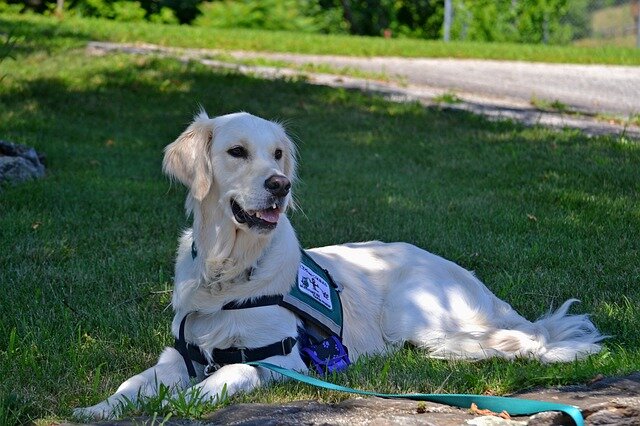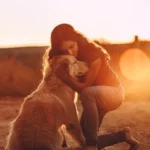Some dog breeds are better suited to certain tasks. You wouldn’t get a Jack Russell to herd your sheep when a Border Collie is much more capable.
When it comes to therapy dogs for people who have autism, you want to make sure that the pup is going to be absolutely perfect for the job.
Getting a therapy dog for someone with special needs requires a bit more thought than just getting a family pet. You want a breed that is easy to train, the right size for the individual they are working with, calm and gentle.
First Things First
Therapy dogs are not the same as an Emotional Support Animal (ESA) or a Service Dog. They play a different role in an individual’s life. They are sometimes referred to as comfort animals as they are there to provide emotional comfort to their human. They don’t do any specific tasks but are there to provide love and support.
Above all else, when picking a therapy dog for yourself or someone with autism, make sure the temperaments and the breed are a good fit.
Below we have 10 breeds of pups that will make a good therapy dog for someone with autism.
1. Golden Retriever
A golden retriever is a medium-large breed who typically has a good temperament and is known to be easy to train. They have been used as service and therapy dogs for a long time as they always do their best to please their owners. They are a top choice as a first pet, and for families with children who have special needs. Despite their size and need for space, they are fairly low maintenance and very affectionate.
They are gentle, patient, and intelligent, making them ideal for individuals with autism who may want to take it easy. If you are looking for excellent companionship, this is the pup for you.
2. Beagle
Beagles are a medium to small-sized breed, maxing out at about 30lb. They aren’t ideal for all families with autistic individuals, but they are the perfect companion pet for some.
Beagles can be a little tougher to train than some other dog breeds only because they are quite independent, but they are a bubbly, playful breed who often have cheerful personalities.
One thing to note is they can be on the vocal side, so if you or your autistic loved one is sensitive to noise, be sure to either train the pooch super well or perhaps choose a slightly quieter breed. However, if you are looking for a pup to play with and keep you in good company, this is the one for your family.
3. Bichon Frisé
If you are looking for a small breed that is a big fan of cuddles and fuss, a Bichon Frisé will tick those boxes. As therapy dogs, they are devoted, happy, and they aren’t likely to spook easily at noises, especially when trained well. In the moments where an individual with autism might feel overwhelmed it’s a benefit to have a calm presence around to help.
These pups are very tolerant of young children too. If you are looking for a friend for your child with special needs, this cheerful and energetic little cotton ball (who incidentally is hypoallergenic) is perhaps the right choice.
4. Miniature Schnauzer
Not only do these dogs come with a cute mustache, but they are also small enough for apartments (landlord permitting) and don’t shed a lot. They are non-threatening and playful while also being excellent watchdogs. A child with autism may benefit from the games you can play like fetch or tug of war.
Despite their small size, they are sturdy and excellent with kids. You can even get your kids involved in training this breed as these are smart and easy to train. They will make an excellent and loyal friend to any adult or child with autism.
5. German Shepherd
German Shepherds are a well-known breed of working animal. We see them as police and military dogs, service dogs, and they do, in fact, make fantastic therapy dogs for those with autism.
Highly intelligent and extremely loyal, these pups are perfect as family pets and can easily keep up with children as they have lots of energy. Trained well, they will make an amazing and gentle companion to an individual with autism.
6. Samoyed
These big white fluffy pups are sometimes called “happy clouds”, and they really do live up to that name. Samoyeds are gentle with everyone, from children to seniors, and are highly intelligent. They are easy to train too and find joy in completing tasks for their humans.
A big benefit of this medium-sized dog is it can provide warm cuddles when needed. They do require a bit more maintenance than other pups since they are long-haired, but grooming and walking time can provide great bonding opportunities for humans and pups.
7. Pug
These small dogs are probably not the first that comes to mind for a therapy dog breeds, but they can be great companions. They are a bit more work than some other breeds as they shed a lot and are prone to more health issues than other dogs. However, they are also quiet compared to other dogs and, while inside, tend to be relaxed lapdogs just wanting to chill out.
These dogs are also adorably funny, brightening up your day with their goofy little smile. If you or the person you know would prefer a dog to hang out with and just give love and affection to, pugs fit the bill.
8. Corgi
The corgi is probably more associated with royalty than being a therapy dog. They can be a little tricky to work with as they are highly intelligent, but they make fantastic therapy dogs in the right place with the right training. They are short and sturdy, obedient, and have an even calm temperament. For those with autism, it is great to have such a positive influence nearby to encourage empathetic feelings.
For someone with special needs or autism, these pups are friendly, affectionate lapdogs.
9. Bernese Mountain Dog
This dog breed gets really big, and these gentle giants are excellent weighted blankets and can have a calming effect on people with autism.
There are only a few downsides to this dog: the potential health issues and the amount they shed and drool. If you are prepared for these things, you sign up for an incredible, loyal, and calm lump of a pup.
With the right persistent training, these can be the ultimate support for the family. They are willing to please and fierce guardians. These pups do not get anxious easily and are very sure of themselves without getting stubborn like other dog breeds. In return, this can have a potentially calming effect on a person with autism.
10. St. Bernard
St. Bernards take up a LOT of space but are another gentle giant. They drool and shed, but these are tiny issues for the personality you will bring into your house with this dog breed.
These big pups are excellent snugglers for those who get anxious or worried, just like a big teddy bear. They are patient, obedient, and nearly never snap, making them perfect for children and adults with autism alike.
Despite the mess they make with their hair, they are an increasingly popular choice for therapy dogs because of how docile they are. This pooch is extremely tolerant for kids, adults, or the elderly with special needs or autism and will be the perfect friend for them.
Conclusion
Big or small, playful or relaxed, the dog you choose to help you or your loved one with their autism should be a carefully considered choice. Each dog breed will have its benefits, and its disadvantages then need to be looked at.
You are bringing in the dog to help, but you will also need to be able to accommodate them in your home. However, if you are willing to put in the careful training, they will be an amazing addition to your family and for the loved one in your life with autism.
If you need any help or advice when it comes to choosing the right dog breed to help a person with autism, get in contact with our professionals at ESA Registration.











